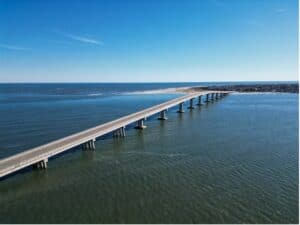Cape May County Bridge Commission Transitions to Cashless Tolling
In a significant modernization effort, the Cape May County Bridge Commission (CMCBC) is set to eliminate traditional toll collectors, transitioning exclusively to E-ZPass and toll-by-mail systems. Originally scheduled for April 1, 2025, the transition has been pushed back to May 10, 2025, due to technical delays with Conduent State & Local Solutions, the company managing E-ZPass in New Jersey. This change is expected to streamline toll collection, reduce traffic congestion, and improve efficiency for drivers using the county’s key bridges.
Historical Overview of the Cape May County Bridge Commission
Established in the early 20th century, the CMCBC has played a pivotal role in developing and maintaining critical infrastructure within Cape May County, New Jersey. The commission oversees several key bridges that connect the mainland to the county’s barrier islands, facilitating commerce, tourism, and daily commutes.
Bridges Under the Commission’s Jurisdiction
The CMCBC operates five toll bridges along Ocean Drive, connecting various shore communities:
- Corsons Inlet Bridge: Links Ocean City to Strathmere via Cape May County Route 619.
- Grassy Sound Bridge: Connects North Wildwood to Stone Harbor.
- Middle Thorofare Bridge: Connects Wildwood Crest to Cape May.
- Ocean City-Longport Bridge: Provides access between Ocean City and Longport.
- Townsends Inlet Bridge: Connects Avalon to Sea Isle City.
Transition to Cashless Tolling
As part of a growing industry trend, the CMCBC is moving toward fully electronic tolling to enhance traffic flow and reduce operational costs. By eliminating cash toll collection, the commission aims to make travel across the county’s bridges more efficient and convenient.
Implementation Timeline
The transition to cashless tolling is set for May 10, 2025. From this date, all toll transactions will be processed electronically through E-ZPass or a toll-by-mail system. The delay from the original April 1 deadline was due to technical adjustments required by the toll system provider.
Toll Payment Methods and Fee Structure
Motorists will have two options for toll payment:
- E-ZPass: Tolls will be automatically deducted from pre-paid accounts, offering a seamless and discounted payment method.
- Toll-by-Mail: Vehicles without E-ZPass will have their license plates photographed, and a bill will be sent to the registered owner.
Updated toll rates as of May 10, 2025:
- E-ZPass Users: $2.50 per crossing.
- Toll-by-Mail Users: $2.50 per crossing, with an additional $5 monthly processing fee, applied regardless of the number of crossings.
Motorists who fail to pay their toll bill within a year will be subject to additional late fees.
Impact on Toll Workers
With the elimination of cash toll collection, toll booth positions will be phased out. However, between 12 and 15 former toll workers will be offered part-time employment as bridge tenders to assist with drawbridge operations for marine traffic. The transition is estimated to save the commission between $400,000 and $500,000 annually, a significant financial benefit for the agency.
Legacy Toll Ticket Buyback Program
Before the implementation of E-ZPass in 2018, the commission sold discounted toll tickets for commuters. These tickets, previously available at $1.20 each, will no longer be accepted after the transition. However, the commission has launched a ticket buyback program, allowing commuters to return unused tickets for a refund up to 60 days after the change takes effect. More than 4,000 tickets have already been refunded through this program.
Public Awareness and Safety Measures
The CMCBC has initiated a public awareness campaign to educate motorists about the transition. Digital road signs along the bridges are already displaying messages about the change, and outreach efforts will increase as the deadline approaches.
To ensure a smooth transition, drivers are encouraged to:
- Enroll in E-ZPass to take advantage of lower toll rates and avoid additional fees.
- Update vehicle registration details to prevent toll-by-mail billing issues.
- Familiarize themselves with the toll-by-mail system to understand payment deadlines and avoid penalties.
The Cape May County Bridge Commission’s shift to cashless tolling is a significant step toward modernizing the region’s transportation infrastructure. By adopting fully electronic payments, the commission aims to improve travel efficiency, enhance safety, and reduce operational costs. As the May 10, 2025 implementation date nears, motorists should prepare by setting up E-ZPass accounts or ensuring they understand the toll-by-mail process to avoid extra fees and delays.
